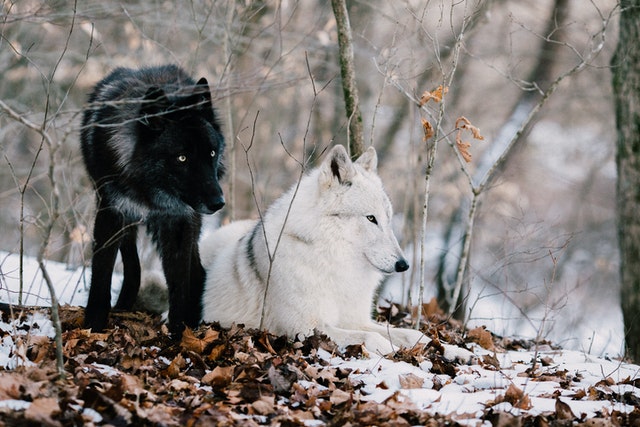One evening, an elderly Cherokee told his grandson about a battle that goes on inside of people.

He said, “My son, the battle is between two wolves inside us. One is all evil: it is anger, envy, jealousy, sorrow, regret, greed, arrogance, self-pity, guilt, resentment, inferiority, lies, false pride, superiority, and ego. The other is good: it is joy, peace, love, hope, serenity, humility, kindness, benevolence, empathy, generosity, truth, compassion, and faith.”
The grandson thought about this for a minute, then asked his grandfather, “Which wolf wins?”
The old Cherokee simply replied, “The one that you feed.”
This is a good summary of how we are as human beings. When we’re feeding the bad wolf, that’s how we get into problems within marriage and other aspects of our lives.
Let’s call the bad wolf the “survival self” and the good wolf the “thriving self.” To some extent, we need the bad wolf because it keeps us alive as humans. Think of an innocent baby; they can’t do much, but they can cry. Crying isn’t a great thing, but it helps adults figure out babies’ needs, and that keeps the babies alive. Young kids use the survival self for external control. Similarly, the survival self—the bad wolf—has its time and place, but it cannot be fed if we want to thrive as adults, because we hate when people force their external control on us, which is exactly what the bad wolf does.
The bad wolf comes out when we feel like we don’t have the control we need. We feel the need to control our own survival, but when people say things like “you should” or “you ought to,” we feel like they’re trying to control us and use our guilt against us. That makes us want to resist.
If you will starve the bad wolf and feed the good wolf, then your relationship will get better and better. To help you do that, ask yourself, “What am I doing, thinking, or saying that makes our relationship better or worse?” As a general rule, if it makes the relationship better, then it’s the good wolf, and you should do more of it.
Things that Feed the Bad Wolf
If in the long run only one person is always doing things for the other and it’s way out of balance, then that is actually feeding the bad wolf, because that’s when the other individual is acting as the bad wolf and just consuming everything you give them. Probably about a third of all the couples I get in my office have gotten out of balance like that. 10-20 years into the relationship, the good wolf finally gives in and says, “I’m done! I quit. I’ve been working hard all this time, and it’s not worth it.”
Many times, I’ve also seen a bad wolf emerge because of alcohol. I’ve never seen any relationship improve with alcohol involved. Alcohol feeds the bad wolf.

Self-esteem is another cause of a bad wolf because it’s all about external judgments. High self-esteem is judging people as “less than” yourself, and low self-esteem is judging yourself as less than others. Both are bad, because you cannot have high or low self-esteem without making judgment.
Judging by self-esteem is a childish way of viewing the world. The more mature way is on the good wolf side: instead of looking at self-esteem, look at self-worth. Think of when you look at a baby; they are innocent and cannot be judged. Naturally, as humans, we have so much self-worth, and our value doesn’t change based on how we judge it.
Sure, maybe we can judge someone’s ability to do something. Maybe they’re better than you at the guitar, and that’s great—you can both celebrate their skill, and maybe you can learn from them. You’ve both achieved something when you’re learning, and that’s what’s valuable and celebratory.
A Different Wolf Isn’t a Bad Wolf
Sometimes we think something is a “good wolf vs. bad wolf” situation when it’s actually just a “good wolf vs. different good wolf” situation. You and your spouse grew up in different environments and homes, so that’s natural. But even though basketball is different from football, they’re both sports. They both have rules, goals, and boundaries. Similarly, you’ll have some similarities in how you were raised. Take the best of both sports—the best of both good wolves—and put those together.
What Do You Do When a Loved One Is Stuck in a “Bad Wolf” Mode?
First, I try to figure out why they’re stuck in that mode. Often, someone goes into survival mode when they’re in pain, when they’re tired, or when they’re not eating well. In specific, most people don’t get enough vitamins; in today’s society, even if you eat just fruits and vegetables from the store, you can’t get all the minerals and vitamins you need for your body, and supplements may help more than you’d think.

If it’s not diet, pain, or sleep deprivation, and it seems like it’s just their attitude, then we may need to set up boundaries. It’s exhausting to try to keep up with the demands of someone else’s bad wolf. If you’re constantly being the good wolf and they’re just eating that up, then you have to learn to say no and redirect their expectations. For more information on how to take these steps, it may be helpful to read this book called Boundaries.
Commitment to the Good Wolf
So, how committed are you to feeding the good wolf in your relationships? Are you feeding the bad wolf by getting out of balance, or is alcohol involved, or is there judgment going on? Is someone tired, in pain, or not eating right? Is there something else feeding the bad wolf? Focus on which wolves you’re feeding and how. And make those adjustments to change your relationship!
Meet Rod

Rodney Limb has always enjoyed listening to people and helping them work out problems and struggles. As a Licensed Clinical Professional Counselor (LCPC), Licensed Marriage and Family Therapist, and a Nationally Licensed Hypnotherapist for over 20 years, he has helped hundreds of couples create a happy and thriving marriage out of disaster. He also provides counseling for anxiety, depression, stress, PTSD and overcoming various behavioral addictions.
A Deeper Look into Spiritual Truths
“Your beauty should not come from outward adornments, such as elaborate hairstyles and the wearing of gold jewelry or fine clothes. Rather, it should be that of your inner self, the unfading beauty of a gentle and quiet spirit, which is of great worth in God’s sight.”—1 Peter 3:3–4 NIV
“The mind governed by the flesh is death, but the mind governed by the Spirit is life and peace.” — Romans 8:6 NIV

